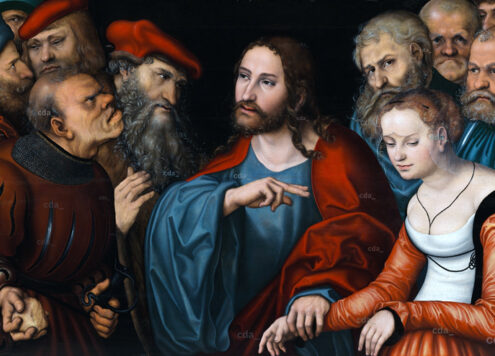The widow’s mite has reference to the gospel story ( Mark 12 : 41-46 and Luke 21 : 1-4 ) where Jesus praised a poor widow for her generosity. Although she gave very little in terms of money, she gave more than all the others who gave from their abundance. The widow’s generosity is exemplary, not because of the amount she gave, but because of the way she gave. She gave with heart, and out of her want.
To some, this may seem a strange way of evaluating money. The large donations of the rich surely seem to be worth more than the widow’s mite or penny. This is true as far as quantity goes, but not in terms of quality. Jesus explains himself: the rich gave what they didn’t need (“from their surplus”) whereas the widow gave her survival money (“from her poverty”). The poor widow surpassed the bookkeeper’s mentality we often adhere to in calculating generosity.
Attachment to money is a serious problem which causes untold suffering in today’s world.. Business people often sacrifice family love in favor of making money. They often pay their workers the lowest wages they can in favor of the highest profits. They often forget that love of others, promoting good relationships in the workplace, is far more important than financial gain or corporate greed.
Last weekend, I was in Washington for a birthday celebration of a dear friend where I experienced lots of generosity. I was also staying in a Citizen M hotel for the first time. I couldn’t help being impressed by the spirit of helpfulness of the entire staff. I sat down beside a young black man while he was on a break, and I asked him, inquiringly,
“Do you like working here?”
“I love it,” he replied, convincingly.
“Well, it shows through your generosity and helpfulness,” I hastened to respond.
The widow’s example of generosity is a reminder to all of us, rich and poor, that the little things done with love are more important than the big things done out of self-interest. You don’t have to possess much to be generous. It can manifest itself in all kinds of ways. Here are just a few:
When you forgive someone you are showing generosity of spirit.
When you help others in need, you impart the spirit of generosity.
When you spend quality time with your family, you’re sharing with them the generous gift of love.
When you volunteer to help a good cause, you are spreading the fruits of generosity.
When you treat people with respect, you empower them with generosity.
The Latin root of the word, generosity, means “of noble birth.” But generosity is by no means limited to those in positions of power as the story of the poor widow amply demonstrates. Generosity is the trait of a noble spirit, not of noble birth. That’s what the poor widow possessed to an exemplary degree, and that’s what you can possess by imbibing the same spirit.
Anyone can become generous simply by paying attention to his or her actions,
—Fr. Hugh Duffy











4 Comments
BARTHOLOMEW N OKERE
Fr. Duffy, loved your catechesis on the famous Widow’s Mite! The needs & reward for the oriental hospitality given to the prophet Elijah by the poor widow of Zarephath and the other in the gospel of Mark that gave all that they had,their entire livelihood. Shows that kindness begets kindness. Loved your interaction with the black man @ the Citizen M. hotel that made you to express his helpfulness.
Nancy Tupas
This was so great! Thank you!
Carole Anne Fisher
I so enjoyed this, Father Duffy. Thank you!
I once heard this similar belief in a speech
given by one of my bosses, about generosity
not being a competition. Give a smile, a hand
when needed. Share your particular gift or
talent. Be courteous and respectful of others.
If we as a society try and live this ,even a little
each day. What a more lovely world this would be.
Tom Rooney
Very good indeed thank you